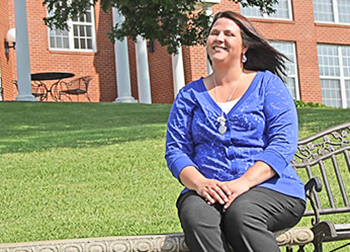 Some people decide they want to go to college while they are in high school, some after they join the workforce. Vanessa Butler decided she wanted to go to college while she was in prison.
Some people decide they want to go to college while they are in high school, some after they join the workforce. Vanessa Butler decided she wanted to go to college while she was in prison.
Butler, 25, said that she’d thought about college as a child, but the dream slipped away after her father died when she was 15 and she got caught up in drugs and crime. She only rekindled her fire for education after she finally ended up in prison and started working with the Educational Opportunity Center, a federally funded operation based at Rogers State University that helps under-served groups, including prisoners, access higher education.
RSU’s Opportunity Center is the seventh-largest of its kind in the country and the largest of the five programs in Oklahoma. It spans 27 counties in northeast Oklahoma and serves 3,200 people each year, more than a third of whom are incarcerated.
That number is set to decline, though, as the federal government is cutting the Opportunity Center’s $592,000 budget by 5.32 percent this year and may cut an additional 5.32 percent each year for the next two years. The reductions are the result of federal sequestration, automatic budget cuts forced by congressional gridlock.
That means the Opportunity Center likely won’t be able to reach as many people in coming years, said Susan Bedwell, who serves as project director for the Opportunity Center at RSU. The federal Department of Education bases the center’s client numbers on its funding, she said. If the funding goes down, the number of people that the center serves probably will, too.
The cuts will have a real impact on the program’s offerings, which have been proven to save the government money in the long run by improving the employability of people from low-income backgrounds and people who have been incarcerated, Bedwell said.
The Opportunity Center’s primary goal is to help people return to education by matching them with a counselor who works with the participant to establish career goals, identify prospective schools and complete the application process. While the Opportunity Center is based at RSU, the counselors will help them apply to the school that best fits their geographic or programmatic needs.
The program also teaches the “soft skills” that prospective students will need in the college arena, such as how to behave in a job interview, create a resume and manage their finances.
Those are skills that many college-bound students would learn from a parent, but people like Butler, who grew up in poverty in Tryon, Okla., have no access to that kind of support. “I didn’t grow up in a healthy environment,” she said. “I didn’t have anybody to help me with that kind of thing. I wouldn’t have known what to do or where to go. Having someone there for me to point me in the right direction has made all the difference in the world.”
Kyle Davis, a counselor with the Opportunity Center, met Butler in 2010 at the Eddie Warrior Correctional Center in Taft, Okla., where she was serving three years on a trio of felony charges for selling methamphetamine to an undercover law enforcement officer and helping her boyfriend burglarize a house.
Butler said that the courts offered her probation, but she asked to go to prison. “If they had given me probation again, I knew I’d just go back to hanging out with the same people and doing the same thing.”
The first thing Davis did after meeting Butler was give her an education assessment. Butler said she tested at a fifth-grade level. “I’d just done so much drugs and abused my body so much that I forgot everything,” she said.
Discouraged but undeterred, Butler studied every day and steadily moved up grade levels. Three months later, she passed the GED. When she was released from prison last year, she applied to a community college at first, but her dream was to go to a university. “A community college is one thing. But to be able to say, ‘I’m going to Rogers State University, and I’m successful there.’ That’s what I wanted to be able to tell people,” she said.
After Butler was released in 2011, Davis helped her fill complete the application to RSU. Peggy Rice, the wife of RSU President Larry Rice and a member of Butler’s church, wrote a letter of recommendation.
One day, Butler got a letter from RSU in the mail. She was in.
Butler, who maintained a B-average during her first year, will enter her second year at RSU this fall where she’s majoring in community counseling.
Success stories like Butler’s show how vital the Opportunity Center’s programs are to the community, Bedwell said.
The programs also have proven to be extremely cost effective over the long run.
A prisoner’s risk of re-offending declines rapidly with each level of education they attain, she said. An offender without a GED has a 66 percent chance of returning to prison.That drops to 32 percent for those with a GED, 12 percent for those with some college education and only 8 percent for those with a college degree.
The government may be saving money now, but it will only pay more when felons are released back into the community with no job prospects or education and return to a life of crime, Bedwell said.
Butler credited RSU and the Opportunity Center with giving her a second chance at life. “If the program gets cut, people won’t have that hope that they can change their lives. They will end up back out on the street. I know I would have.”
